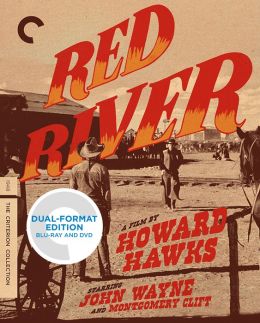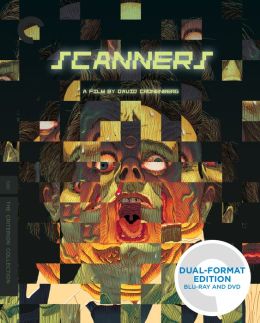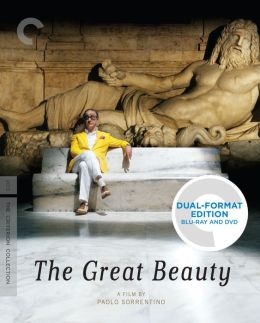One of the most eagerly awaited events on the home theater calendar, Barnes & Noble’s half-off sale on Criterion Collection titles–ends today. Bummer. But there’s still time to place an order, and if not, relax, don’t shoot the messenger, it’s back in November. So what to get now, or save up for in fall? Here’s a few suggestions: A Hard Day’s Night: Not its first appearance on home video, but the first that will truly satisfy Beatlemaniacs as we commemorate their arrival on our shores 50 years ago. It looks, well, fab: director Richard Lester supervised a splendid 4k restoration that teases as much detail as can be had from the modestly budgeted black and white production (albeit a production whose modest budget was earned back, and then some, on the strength of pre-sale tickets before frenzied audiences had seen a single frame). More importantly, it sounds amazing: the original mono soundtrack is supplemented by new stereo and 5.1 surround mixes that put the Beatles right there in the room with you. (Yes, it’s possible to create new mixes that aren’t gimmicky crap, and this is a model of the form.) Supplements gather some of what’s been on prior releases and add tremendous value–a behind-the-scenes feature, “In Their Own Voices,” uses period interviews with the principals to tell the story of an unprecedented cultural happening from the inside, and Lester contributes a rare new audio interview discussing his formative work, like the Oscar-nominated short The Running Jumping & Standing Still Film. And the movie’s as fun as ever. “How did you find America?” “Turned left at Greenland.”
 Red River: Criterion hasn’t focused on Westerns, but when it does the work can be excellent. A Freud-laced favorite of mine, The Furies (1950) with Barbara Stanwyck, is another worthy addition to your cart, as is this more widely acknowledged classic, a Howard Hawks mega-movie from 1948. I’m not as keen on it as some; for one thing, Howard Hughes, an interested party then in the movie biz, mangled what should have been a stronger ending with his interference. But it’s hard to quibble with the chemistry between John Wayne, a star who fascinates me more and more (throw Scott Eyman’s outstanding bio John Wayne: The Life and Legend in your cart, too) and newcomer Montgomery Clift, ditto (Patricia Bosworth’s peerless 1978 volume on his too short life, a model of its kind, is available as a Nook book). Their offscreen wariness, and budding respect, is up there on the screen, amidst a jaw-droppingly arranged cattle drive and other genre tropes that their presence invigorates. And there’s much to saddle up with on this disc, too, including two versions of the film (I prefer the longer one but both are commendable) and interviews new and vintage with Peter Bogdanovich, whose 1972 chat with the director is excerpted.
Red River: Criterion hasn’t focused on Westerns, but when it does the work can be excellent. A Freud-laced favorite of mine, The Furies (1950) with Barbara Stanwyck, is another worthy addition to your cart, as is this more widely acknowledged classic, a Howard Hawks mega-movie from 1948. I’m not as keen on it as some; for one thing, Howard Hughes, an interested party then in the movie biz, mangled what should have been a stronger ending with his interference. But it’s hard to quibble with the chemistry between John Wayne, a star who fascinates me more and more (throw Scott Eyman’s outstanding bio John Wayne: The Life and Legend in your cart, too) and newcomer Montgomery Clift, ditto (Patricia Bosworth’s peerless 1978 volume on his too short life, a model of its kind, is available as a Nook book). Their offscreen wariness, and budding respect, is up there on the screen, amidst a jaw-droppingly arranged cattle drive and other genre tropes that their presence invigorates. And there’s much to saddle up with on this disc, too, including two versions of the film (I prefer the longer one but both are commendable) and interviews new and vintage with Peter Bogdanovich, whose 1972 chat with the director is excerpted.
Riot in Cell Block 11: In 1954, before his association with Clint Eastwood, Dirty Harry (1971), and Escape from Alcatraz (1979), Don Siegel directed this high-voltage B movie, an indictment of unsanitary and unsafe conditions at Folsom prison that puts noir veterans Neville Brand (a sympathetic inmate) and Emile Meyer (an understanding warden) on a collision course as tempers flare and the shaky system is tested. It’s a tense 80 minutes through a hell glimpsed briefly by producer Walter Wanger, who, in a real-life noir scenario, did four months in a minimum security facility for shooting agent Jennings Lang, the lover of his wife, actress Joan Bennett. (That Lang survived must have kept him away from the worst of the big house.) Criterion should likely have gone with a wider-format transfer than the full-frame one used but the extras, focused on the two filmmakers, illuminate a tangy, once-controversial little gem.
The Great Beauty: The gilded ghetto of the Best Foreign Language Film Oscar ensnared Paolo Sorrentino’s thoughtful, delightful gem. Sure, it deserved to win–but it also deserved a shot at writing, direction, editing, and cinematography awards. (Really, drink in that first kaleidoscopic scene, which sets the stage, and tell me that isn’t superior cutting.) There’s nothing keeping it and other overseas fare from being nominated in those categories, yet placing them in the “foreign language” box tends to wall them off. The real travesty is that actor Toni Servillo, in a magnificent performance as a prominent yet unfulfilled writer separating himself from la dolce vita as he hits retirement age, didn’t make the cut; he brings everything to bear on the part, simply, gracefully. Be that as it may we have a movie-movie to immerse ourselves in, via a lovely transfer that will have you booking a flight immediately, and interview segments with Sorrentino, Servillo, and screenwriter Umberto Contarello.
Il Sorpasso: It’s “the easy life” along the Riviera for Vittorio Gassman and Jean-Louis Trintignant (Amour), as the older hedonist and his younger friend, a law student who had more purposeful ambitions, enjoy wine, women, and song, until a reckoning. Dino Risi’s 1962 road movie, uproarious and melancholy by turns, has some kinship with the films of Alexander Payne, so it’s no surprise that he’s on hand to introduce a film that’s become obscure here over the decades. Revivifying it are a clutch of extras about the director, a phenomenon in his day, and the reminiscences of co-screenwriter Ettore Scola about the sharply observed Italian comedies of that era.
 Scanners: Time to get your freak on with David Cronenberg’s literal mindblower from 1981. It has the feeling of a transitional film from his fascinating outlier efforts in Canada, with more commercial car chases and indelible special effects to knock them flat on their ass in Hollywood. But his next film was the almost unclassifiable Videodrome (1983), not a calling card movie, though he would find a niche with studio support on his own, rigorous, terms. I loved his movies when they played HBO, and spent many a sleepless night glued to The Brood (1979) and this one, with its still-fascinating consideration of science gone amok, breeding misfit “scanners” with powers you don’t want to screw around with. I’m not sure Cronenberg, whose latest, Map to the Stars, is about Hollywood phonies, is too keen on it, though; besides not sitting for any new supplements, his supervised transfer felt too dark to this long-time viewer, and fans with region-free players may want to pick up the less drab UK or German Blu-rays (yes, I own three Blu-ray editions of Scanners, don’t judge me.) But we do hear from intimidating co-star Michael Ironside, whose career this launched, the curious Stephen Lack, whose career this didn’t launch (not that he much cared; he was later cast in the director’s Dead Ringers), and the effects wizards. And the director’s early short, Stereo, gets a nice showcase besides.
Scanners: Time to get your freak on with David Cronenberg’s literal mindblower from 1981. It has the feeling of a transitional film from his fascinating outlier efforts in Canada, with more commercial car chases and indelible special effects to knock them flat on their ass in Hollywood. But his next film was the almost unclassifiable Videodrome (1983), not a calling card movie, though he would find a niche with studio support on his own, rigorous, terms. I loved his movies when they played HBO, and spent many a sleepless night glued to The Brood (1979) and this one, with its still-fascinating consideration of science gone amok, breeding misfit “scanners” with powers you don’t want to screw around with. I’m not sure Cronenberg, whose latest, Map to the Stars, is about Hollywood phonies, is too keen on it, though; besides not sitting for any new supplements, his supervised transfer felt too dark to this long-time viewer, and fans with region-free players may want to pick up the less drab UK or German Blu-rays (yes, I own three Blu-ray editions of Scanners, don’t judge me.) But we do hear from intimidating co-star Michael Ironside, whose career this launched, the curious Stephen Lack, whose career this didn’t launch (not that he much cared; he was later cast in the director’s Dead Ringers), and the effects wizards. And the director’s early short, Stereo, gets a nice showcase besides.
Judex: Comic-Con is over, and the latest superhero-stuffed slates have been revealed. From a different world comes this treasure, the work of Georges Franju, who infused the horror genre with visual poetry in Eyes Without a Face (1959) and in 1963 breathed new life into serialized characters, kin to Batman and all the rest, with a film that has languished. Filled with masks, bird imagery, and convoluted plotting and motivations, Judex returns an entertainment coarsened by commercialism to its pleasurable roots, and stars Channing Pollock, a popular magician, as the avenging figure at its center. A movie that was very hard to see except for stills in fantastic magazines returns in fine shape, supplemented by two short films by Franju (one about cinematic wizard George Melies, of Hugo fame), a 1998 documentary about the filmmaker, and an interview with co-writer Francine Berge.
All this plus a new Blu-ray of one of the label’s estimable Akira Kurosawa holdings on DVD, The Hidden Fortress. An adventure classic that inspired Star Wars sports a crystalline image and another of Stephen Prince’s exquisite commentaries. “The Emperor” of Japanese cinema deserves no less–and whether today or a few months from today you owe it to yourself to explore the world of Criterion on a budget.






Comments